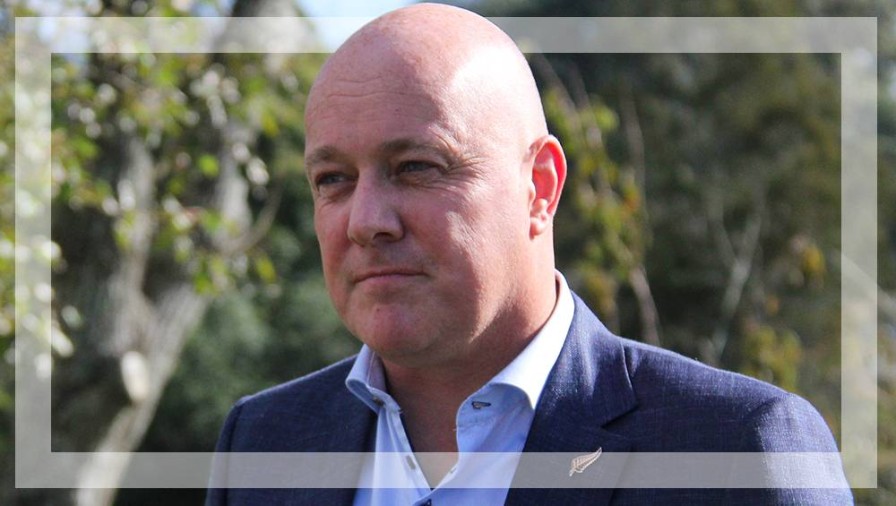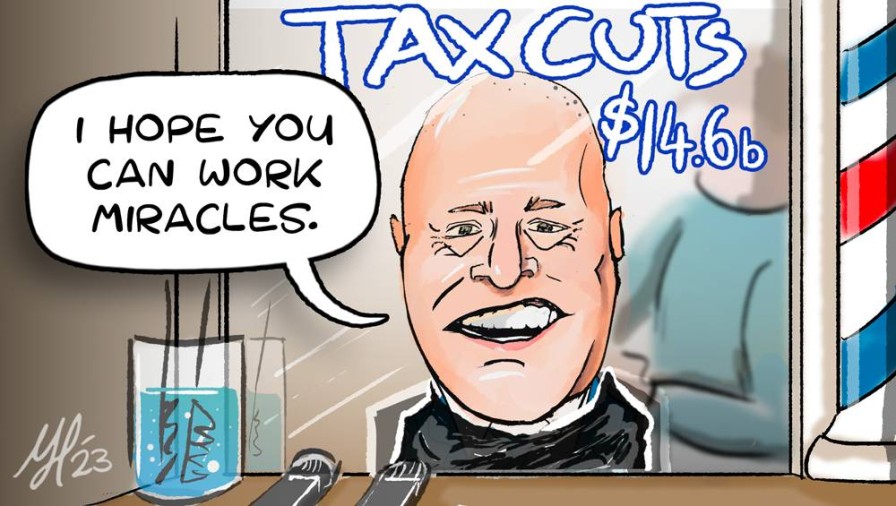Government targets, climate change, tax cuts, media blues
ANALYSIS: The Government is under pressure to save the news media, but the public appears to not care.
Beehive Banter
ANALYSIS: The Government is under pressure to save the news media, but the public appears to not care.
Beehive Banter
Just days after announcing his new action plan for the coalition Government, Prime Minister Christopher Luxon released nine public service targets on which to judge his government against by 2030.
Note that the timeframe goes out to 2030, meaning two more elections before the Government is meant to be held accountable for the targets it has set itself. Voters though will likely make judgements before then on whether they think the Government is making progress or not and the Government will provide quarterly updates starting from about the middle of this year.
Luxon announced the targets at his weekly post-Cabinet news conference. They include reduced waiting times in hospital emergency rooms and for elective surgery. The Government wants to see a 15% reduction in “serious and persistent offending behaviour” by children and young people and a reduction of 20,000 in the number of people victims to assault, sexual assault, or robbery. In education, it has set a target of having 80% of students to be at school 90% of the time and that at least 80% of year 8 students are at or above their age for reading, writing, and maths.
Other targets include reducing the number of people on jobseeker benefits by 50,000 by the end of 2030 and to have 75% fewer households in emergency housing. The Government’s final target is the retention of the 2050 net zero carbon goal, with total net emissions of no more than 290 megatonnes from 2022 to 2025 and 305 megatonnes from 2026 to 2030.
But the day Luxon announced those targets, the Climate Change Commission released its next set of draft advice to the Government, in which it recommends reducing the 2022-25 emissions budget from 290 to 281 MtCO2e and the 2026-2030 emissions budget from 305 to 286 MtCO2e.
The commission said its more ambitious targets reflected changes in the methodology of the greenhouse gas inventory and the fact that there had been a higher rate of forest planting in the past three years than it had originally envisaged.

Prime Minister Christopher Luxon.
It seems unlikely though that the Government – having so publicly put out its target confirming the existing emissions budgets – will accept the commission’s advice if that is the recommendation it finally makes at the end of the year after considering public feedback to its draft advice.
Climate change was also raised when Finance Minister Nicola Willis appeared before Parliament’s Finance and Expenditure Select Committee to be questioned about the Budget Policy Statement. Labour’s climate change spokesperson Megan Woods pointed out there was no mention of climate change in the BPS.
Willis said the Government would largely rely on the emissions trading scheme to drive down emissions and she castigated the previous Government for investing in climate change initiatives that either did not reduce emissions or did so at too high a price. Highly profitable businesses could no longer expect to come to the Government to subsidise their decarbonisation initiatives.
Yet the Climate Change Commmission’s report seems to suggest a number of the previous Government’s initiatives had been successful, with the uptake of electric vehicles greater than expected and a number of industrial heat processes switching from fossil fuels to electricity.
They were funded in part by the clean car discount and the Government Investment in Decarbonising Industry (GIDI) fund, both of which have been scrapped by the coalition.
Meantime, Willis also defended the plan to provide tax relief in the May 30 Budget, as Opposition MPs asked whether the tax package would be funded by increased borrowing.
Willis acknowledged her Government would borrow more but said, as a proportion of GDP, net debt would come down. And she remained adamant the tax package would be paid for by spending cuts and other revenue initiatives, including using money from the ETS, which is no longer being spent on the clean car discount or the GIDI fund.
But Opposition MPs pointed out that, if the Government was not cutting taxes – at an estimated cost of $15 billion over five years – it would not have to borrow as much.

The Government remains committed to tax cuts despite the cost.
During the week, the Government came under more pressure over what it might do to save the news media, as it was confirmed Newshub would close down – with the loss of about 300 jobs – at the beginning of July and that TVNZ was proceeding with its plans to end Fair Go and the Sunday programmes.
Media and Communications Minister Melissa Lee has a paper on the media going to Cabinet but refuses to disclose details about what is in it.
Much of the focus on social media at least is on what the Government is or is not doing, with an expectation from some that it could somehow save Newshub and parts of TVNZ.
Labour’s media and communications spokesperson Willie Jackson said the action Lee had promised to protect democracy and the media was missing.
“It’s not just Melissa Lee who has failed to prioritise the media. The entire Government failed to include it in the 100-day plan, and then failed again to get any mention at all in the second-quarter action plan of priorities for the Government,” Jackson said.
He said the Government needed to pass the Fair Digital Bargaining Bill – which would give media organisations leverage to negotiate with large online platforms to pay them for content – under urgency and Lee needed to get everyone in the media sector in a room and find a solution.
Finding a solution though is not easy, and not much focus has gone on the companies themselves. For instance, couldn’t Newshub’s owner Warner Bros Discovery have done more to save at least a portion of the news service instead of dismissing an alternative plan put forward by Newshub staff?

Media and Communications Minister Melissa Lee.
It is undoubtedly a blow to democracy, as one large news organisation closes down and another reduces its news service. While many say it is the worst day for New Zealand journalism, in the past, large newspapers such as the Auckland Star have closed down and there has been an ongoing contraction in the traditional print media, particularly provincial papers, which has gone largely unnoticed and with little fanfare.
One other element the Government might consider is the fact that public faith and trust in the news media has sunk to an all-time low based on the most recent survey.
The public apparently just doesn’t care.
Brent Edwards is NBR’s political editor.
Sign up to get the latest stories and insights delivered to your inbox – free, every day.